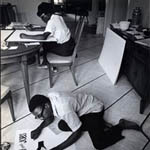By Laura J. Thomson, Director of Processing
 “Working for Freedom: Documenting Civil Rights Organizations” is a collaborative project between Emory University’s Manuscript, Archives and Rare Book Library, The Auburn Avenue Research Library on African American Culture and History, The Amistad Research Center at Tulane University, and The Robert W. Woodruff Library of Atlanta University Center to uncover and make available previously hidden collections documenting the Civil Rights Movement in Atlanta and New Orleans. The project is administered by the Council on Library and Information Resources with funds from the Andrew W. Mellon Foundation. Each organization regularly contributes blog posts about their progress.
“Working for Freedom: Documenting Civil Rights Organizations” is a collaborative project between Emory University’s Manuscript, Archives and Rare Book Library, The Auburn Avenue Research Library on African American Culture and History, The Amistad Research Center at Tulane University, and The Robert W. Woodruff Library of Atlanta University Center to uncover and make available previously hidden collections documenting the Civil Rights Movement in Atlanta and New Orleans. The project is administered by the Council on Library and Information Resources with funds from the Andrew W. Mellon Foundation. Each organization regularly contributes blog posts about their progress.
For more information about the collection described in this post, please contact the Amistad Research Center, reference [at] amistadresearchcenter [dot] org
Last month’s blog entry for the Amistad Research Center highlighted the collection of oral history interviews with Andrew Young in the Tom Dent Papers. The final processing of the entire audiovisual holdings in the Dent Papers and the posting of this information in the “>online finding aid has just been completed and the reality of the breath and scope of Dent’s pursuit of documenting the modern Civil Rights Movement has now been revealed. Thanks to the grant that Amistad received from the Council on Library and Information Resources, the Center’s creation of its online finding aid database is allowing the Center to reveal its rich, yet previously hidden holdings, on the Civil Rights Movement.
Dent’s collection of oral histories, poetry readings, lectures, and performances is extensive, encompassing 905 individual audio recordings dating from 1965 to his passing in 1998. The bulk of the collection documents the modern Civil Rights Movement of the 1960s through three main oral history projects: the Mississippi Oral History Collection (1978-1983), the Andrew Young Oral History Collection (1980-1985), and the Southern Journey Oral History Collection (1992-1997). The main strengths of these interviews are the activities and projects of civil rights workers and organizations, first-hand accounts of police brutality and harassment, and the lives and trials of African American communities during this volatile period in American history. The second focus of the collection is on jazz, particularly New Orleans jazz, jazz funerals, brass bands, festivals, and local musicians. There are twenty years of recorded performances at the New Orleans Jazz and Heritage Festival (1974-1994), as well as individual performances at local venues throughout New Orleans. The third focus of the collection is on African American literature in the form of recorded poetry readings and lectures.
Highlighted previously, the Andrew Young Oral History Collection encompasses 50 individual interviews conducted from 1980 to 1985 as part of Dent’s work on the autobiography of Young. The Young interviews provide detailed accounts of the FBI’s harassment of Martin Luther King Jr. and SCLC staff, the assassination of King in Memphis in 1968, and comments on what Young believes were the factors that produced the Civil Rights Movement of the sixties.
The Mississippi Oral History Project was brought about by Dent’s personal interest in the Civil Rights Movement in Mississippi—with a focus on the capture of stories not covered by the broadcasting industry in America—and evolved from his experiences touring with the Free Southern Theater in the late 1960s. He considered Mississippi at that time to be the “heart” of the southern Civil Rights Movement and realized that a project to document the events, people, and places in Mississippi would be invaluable to the African American community and scholarly research by providing a historical record of the struggles for equality in America. Interviewees of note include John Buffington and the involvement with SNCC; Matthew Suarez and the beginnings of CORE; Bob “Big Daddy” Costley regarding the Free Southern Theater and the Deacons for Defense in Jonesboro, Louisiana; Annie Devine, an early CORE worker in Canton, Mississippi; and Eunita Blackwell on early SNCC workers. Lastly, of interest are audiocassettes of the 1978 Tougaloo Symposium with Jerry Ward and Tom Dent, with presentations and discussions by Annie Devine and Eunita Blackwell.
Dent was inspired to pursue the documentary book project Southern Journey: A Return to the Civil Rights Movement from his experience with the Mississippi Oral History Project and the amount of research and writing materials he had compiled during his work on Andrew Young’s autobiography, An Easy Burden. The Southern Journey Oral History Collection, compiled from 1990 to 1992, contains 174 standard size audiocassettes and 52 microcassettes of narratives by individuals and civil rights workers describing the activities and people involved in the Civil Rights Movement in the states of North Carolina, South Carolina, Georgia, Alabama, Florida, and Mississippi. The narratives also detail daily life for African American communities in the South during this period. Interviews of note include: John Marshall Kilimanjaro (Greensboro, North Carolina), Annie Devine (Canton, Mississippi), L.C. Dorsey (Mound Bayou, Mississippi), and Andrew Young (Atlanta, Georgia). Many interviewees from Mississippi have earlier narratives found within the Mississippi Oral History Collection series.
